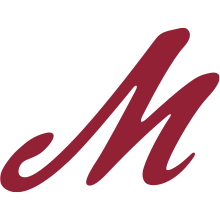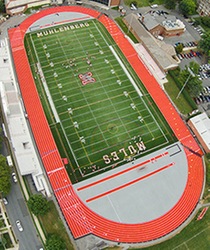Private college in Allentown, Pennsylvania, US From Wikipedia, the free encyclopedia
Muhlenberg College is a private liberal arts college in Allentown, Pennsylvania. Founded in 1848, Muhlenberg College is affiliated with the Evangelical Lutheran Church in America and is named for Henry Muhlenberg, the German patriarch of Lutheranism in the United States.
 | |
Former names | Allentown Seminary (1848–1864) Allentown Collegiate Institute and Military Academy (1864–1867) Allentown Collegiate Institute (1867)[1] |
|---|---|
| Type | Private liberal arts college |
| Established | 1848 |
Religious affiliation | Evangelical Lutheran Church in America |
Academic affiliations | Annapolis Group CLAC LVAIC |
| Endowment | $324.5 million (2024)[2] |
| President | Kathleen E. Harring |
Academic staff | 171 FT 123 PT |
| Students | 2,225 |
| Undergraduates | 2,225 students (43% men, 57% women) |
| Location | , United States 40°35′51″N 75°30′36″W |
| Campus | Suburban, 51 acres (21 ha) |
| Colors | Cardinal and Grey [3] |
| Nickname | Mules |
Sporting affiliations | NCAA Division III Centennial Conference, ECAC |
| Mascot | Marti The Mule |
| Website | muhlenberg |

Muhlenberg College was founded in 1848 in Allentown, Pennsylvania, as the Allentown Seminary by Samuel K. Brobst, a Reformed Lutheran minister. Christian Rudolph Kessler was the school's first teacher and administrator.[4]
The college operated as the Allentown Seminary from 1848 to 1864, as the Allentown Collegiate and Military Institute from 1864 to 1867, and briefly as the Allentown Collegiate Institute in 1867.[5]
In 1867, the college moved into Trout Hall,[6] the former mansion of William Allen's son, James Allen, and was renamed Muhlenberg College in honor of Henry Muhlenberg, the patriarch of the Lutheran church in the United States.
From 1867 to 1876, Muhlenberg's great-grandson, Frederick Augustus Muhlenberg, served as president of the college.[5]
In 1905, the college purchased and relocated to a 51-acre (21 ha) tract located in Allentown's West End, which continues to serve as the present-day campus.[6]
In 1910, seeing a need for evening study in the community, the college began offering courses through a "Saturday School for Teachers".[7] The offerings for adult education outside of the traditional baccalaureate track evolved over the years through various titles, including an "Extension" school.
In 2002, Muhlenberg College opened The W. Clarke Wescoe School of Professional Studies.[7] With the addition of graduate degree programs, the Muhlenberg graduate program was renamed as the School for Graduate and Continuing Studies.
In 2019, the college named Kathleen E. Harring, a social psychologist and the college's prior provost since 2017, as its 13th president and its first female president. She succeeded John I. Williams, Jr., the college's first black president,[8] who served as president from 2015 to 2019.
Muhlenberg was one of the first institutions to fire a tenured professor over pro-Palestinian speech. During the 2024 pro-Palestinian campus protests, the college fired its Jewish anthropology professor, Maura Finkelstein, for sharing a social media post by Palestinian poet Remi Kanazi which was critical of Zionists (he has written "Do not cower to Zionists. Shame them. .. Don’t normalize Zionism. Don’t normalize Zionists taking up space." (the college determined that she had violated its equal opportunity and nondiscrimination policies by sharing his words).[9][10] A Title IX complaint letter concerning “a Jewish anti-Zionist professor on campus who has written articles praising Hamas .. The letter seeks the professor’s removal.”[9]


Muhlenberg's current 82-acre (33 ha) campus is located in a residential neighborhood in Allentown's West End. The campus includes buildings with distinctive traditional European and Protestant red doors laid out on several college quads. The central part of the park-like campus is the college green, which incorporates public art, including Victor's Lament by sculptor Mark di Suvero, which incorporates a red I-beam and is a tribute to the history of steelmaking in Allentown and the surrounding Lehigh Valley during the 20th century.[11]
The college's academic row runs the length of the main college quadrangle with Haas College Center, built between 1926 and 1929, in the center. Miller Tower, the dome and tower on top of Haas College Center, was inspired by Tom Tower at Christ Church College at the University of Oxford. It is named for David A. Miller (class of 1894), the first reporter for The Morning Call, an Allentown-based daily newspaper founded in 1883.[6] Muhlenberg's Polling Institute teams with the newspaper to periodically publish surveys of preferences and trends among Pennsylvanians, especially in the Lehigh Valley.[12]
In 1988, the college opened the Harry C. Trexler Library,[13] named for local industrialist Harry Clay Trexler; it was designed by architect Robert Geddes.[6] The library houses over 310,000 volumes and 360,000 microforms on campus, and has access to over 1.75 million books via interlibrary loan. The library is part of the Federal Depository Library Program.[14] Near Trexler Library is the Philip Johnson-designed Baker Center for the Arts.[15] It houses Martin Art Gallery, which has a permanent collection of over 3,000 works of art and also hosts exhibitions of pieces by student, regional, and international artists.[16]
In August 2004, the Life Sports Center was expanded by 39,000 square feet (3,600 m2), adding a new indoor field house, gymnasium, cafe, health classrooms, and a pool. In 2007, a new science building and additional residence halls were completed and opened.
In addition to its main campus in Allentown, Muhlenberg maintains a 60-acre (24 ha) Graver Arboretum, located 25 miles (40 km) away in Bushkill Township, and Raker Wildlife Preserve, a 40-acre (16 ha) wildlife sanctuary located 15 miles (24 km) away in Germansville.[17]
Muhlenberg College offers bachelor's degrees with academic focuses on liberal arts education and pre-professional studies. Approximately 85% of the faculty have a PhD or other terminal degree in their respective fields.[18] The student to faculty ratio, as of 2018, was 11:1. The college maintains chapters of over 15 national Greek academic honor societies. Bachelor's degree programs for returning adult students are offered through the School of Continuing Education. Graduate degrees have also been offered since the 2020–21 academic year.
The college offers accelerated programs, cross-registration between disciplines, double majors, honors programs, independent study, internships, Army ROTC, student-designed majors, over 160 study-abroad programs, teacher certification, visiting and exchange student programs, and a Washington, D.C. semester.
| Academic rankings | |
|---|---|
| Liberal arts | |
| U.S. News & World Report[19] | 70 |
| Washington Monthly[20] | 60 |
| National | |
| Forbes[21] | 350 |
| WSJ/College Pulse[22] | 166 |
In the 2016–2017 academic year, about one-third (32%) of applicants were offered admission. In the 2013–2014 academic year, about 44% of students accepted for admission into the freshman class were in the top 10% of their high school or preparatory school graduating class, 69% in the top 20% of their graduating class, and 81% were in the top 30%. Three-quarters of the freshman class receive some form of financial aid. Muhlenberg is primarily a regional college, with 72% of incoming freshmen coming from Pennsylvania, New Jersey, or New York state. However, the school also receives applications from the West Coast, including students from Arizona, California, and Oregon.[23]
In its 2025 rankings, U.S. News & World Report ranked Muhlenberg College 71st among the nation's liberal arts colleges.[24] Forbes ranked Muhlenberg 86th on their list of liberal arts colleges in the United States.[25]

Muhlenberg College athletic teams are the Muhlenberg Mules and compete in NCAA Division III. The college has 22 intercollegiate sports, which belong to either the Centennial Conference[26] or Eastern College Athletic Conference.
Both men's and women's teams exist for basketball, cross country, golf, lacrosse, soccer, tennis, track and field, and wrestling. Men's teams exist for baseball and football; women have teams for softball, field hockey, and volleyball.
In 2004, additional athletic facilities were built west of the field house. Updated tennis courts were built in 2003 and two fields were added in 1997 and 1998. The baseball and softball teams do not have on-campus facilities. The football, field hockey, and track and field teams each perform at Scotty Wood Stadium, at 3400 West Chew Street, on the Muhlenberg College campus.
In 1900, the Muhlenberg Mules football program was founded as Muhlenberg College's first official varsity sport. Doggie Julian was its head coach at from 1936 to 1944; his career record was 56–49–2. Julian was also Muhlenberg's head basketball coach during this time and the head baseball coach from 1942 to 1944.[27]
In 1946, Ben Schwartzwalder was named head football coach.[28] In his first season, he guided the Mules to a 9–1 record[29] and a national championship with Muhlenberg defeating St. Bonaventure University in the Tobacco Bowl.[29] The following year, in the 1947 season, Schwartzwalder again led the Mules to a 9–1 record; the season's only loss came by one point, in a 7–6 loss at Temple. The Mules declined an invitation that season to appear in the Tangerine Bowl.[30] In 1949, Schwartzwalder departed to coach Syracuse.
After Schwartzwalder departed for Syracuse in 1949, the Mules fell off the national radar until the hiring of Mike Donnelly in 1997. Despite a rough 1–9 inaugural campaign, Donnelly turned the team around. From 2000 to 2004, the Mules won five straight Centennial Conference championships[31] and earned five straight postseason berths. In 2007, the Mules again won the Centennial Conference and received another berth in the NCAA playoffs, winning their first-round game before falling in the second round. Donnelly's team won the Centennial Conference again in 2008 and earned a playoff berth, but fell in the first round. In 2010, they returned to the playoffs with the same result.
In the 20th century, at least three Muhlenberg players went on to play in the National Football League: Sisto Averno (with the Baltimore Colts, Dallas Texans, and New York Yanks between 1950 and 1954), Charlie Copley (with the Akron Pros and Milwaukee Badgers between 1920 and 1922), and Tony Zuzzio (with the Detroit Lions in 1942).
Since the 2000 season, Muhlenberg has compiled a 66–28 overall record in the Centennial Conference, second-best among all active and former members behind only Johns Hopkins University. The Muhlenberg football team has won the Centennial Conference championship seven times in the 2000s.[32]
Nate Milne was named Muhlenberg's head football coach in 2018. He has since compiled a 35–5 record over his first three seasons.[33] In 2019, Milne was named AFCA Coach of the Year Award for NCAA Division III.[34]
In addition to its 22 NCAA teams, Muhlenberg College has sports club teams in ultimate frisbee and women's rugby.
More than 100 clubs and organizations are on campus. In addition, the Muhlenberg Activity Council is responsible for bringing events and activities to campus. The college arranges off-campus community service opportunities and intramural and club sports for students.
The college's official student-run print publication is The Muhlenberg Weekly. Established in 1883, the paper is published every week while school is in session. The student-run radio station, WMUH, which broadcasts at 91.7FM, is operated year-round by both students and volunteers from the surrounding Lehigh Valley community. It is also available online by live stream.[35]
There are four sororities and four fraternities affiliated with the college.[36]
Despite its Lutheran affiliation, Muhlenberg has attracted a large number of Jewish students, estimated in 2024 to be around 30% of the student body.[37][38] Muhlenberg is one of only a few American liberal arts colleges to offer a Jewish studies major and minor; the Muhlenberg College Hillel is the largest student organization on campus.[39][37]
Seamless Wikipedia browsing. On steroids.